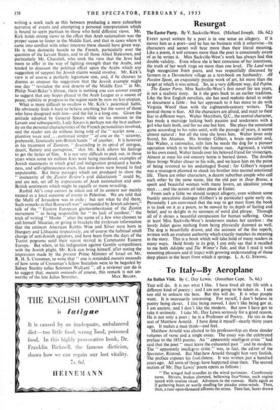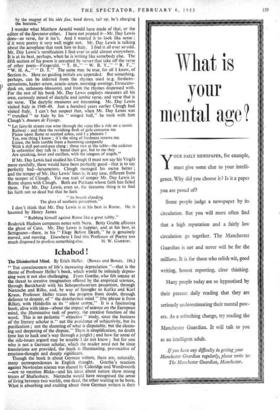- To Italy—By Aeroplane
An Italian Visit. By C. Day Lewis. (Jonathan Cape. 7s. 6d.) Tins will do. It is not what I like. I have lived all my life with a different kind of poetry ; and I am not going to be taken in. I am too old to unlearn the best. But this will do. It is what people want. It is necessarily interesting. For myself, I don't believe in poetry being clever. I like being moved, I don't like being got at. I am ancient, and I don't like the modern. But now I have got to take it seriously. I take Mr. Day Lewis seriously for a good reason. He is not only a poet ; he is a Professor of Poetry. He sits in the seat of Matthew Arnold. I have done it myself—nearly thirty years ago. It makes a man think—and feel.
Matthew Arnold was elected to his professorship on three slender volumes of verse and a single essay. The essay was the celebrated preface to the 1853 poems. An " apparently intelligent critic " had said that the poet " must leave the exhausted past " and be modern. The " apparently intelligent critic " was, in fact, the editor of the Spectator, Rintoul. But Matthew Arnold thought him very foolish. The preface exposes his foolishness. It was written just a hundred years ago. All sorts of thing; have happened since then. The second section of Mr. Day Lewis' poem opens as follovh : " The winged bull trundles to the wired perimeter. Cumbrously turns. Shivers, brakes clamped, bellowing four-times, each engine tested with routine ritual. Advances to the runway. Halts again as if gathering heart or warily snuffing for picador cross-winds. Then, then, a roar open-throated affronts the arena. Then fast, faster drawn by the magnet of his idie fixe, head down, tail up, he's charging the horizon."
I wonder what Matthew Arnold would have made of that, or the editor of the Spectator either. I have not printed it—Mr. Day Lewis does—as verse, for it isn't. And 1 wanted it to look like sense ; if it were poetry it very well might not. Mr. Day Lewis is talking about the aeroplane that took him to Italy. I find it all ever so odd. Mr. Day Lewis's versification I find ever so odd almost everywhere. It is at its best, perhaps, when he is writing like somebody else. The fifth section of his poem is occupied by verses that take off the verse of other poets—Fitzgerald, " T. H.," " W. B. Y.," " R. F.," "W. H. A.," D. T." The same may be true, for all I know, of Section iv. Here no guiding initials are appended. But something, perhaps, can be inferred from the rhymes used (e.g. freshens- carnations, hazier-azure, acacia-azure, morning-awnings, Etruscans- dusk on, unbosom-blossom), and from the rhymes dispensed with. For the rest of his book Mr. Day Lewis employs measures all his own, curiously mixed of dactylic and iambic verse, and verse that is no verse. The dactylic measures are interesting. Mr. Day Lewis visited Italy in 1948-49. Just a hundred years earlier Clough had visited Italy. I can't but suspect that, when Mr. Day Lewis was " trundled " to Italy by his " winged bull," he took with him Clough 's Amours de Voyage.
" Let fairy-lit streets run wine through the veins like a ride on a scenic Railway : and then the ravishing flesh of girls consume me Flame upon flame to scented ashes, and I a phoenix ! Yes, one thing I know ; it's the sting of freshness renews me. Listen, the bells tumble from a humming campanile With It dull pot-and-pan clang : those two at the table—the cadence Is unfamiliar they talk in : banal their gist, but to me they Are speaking, lover and carillon, with the tongues of angels.'
If Mr. Day Lewis had studied his Clough (I must not say his Virgil) more carefully, these would have been perfectly good—that is to say perfectly bad—hexameters. Clough managed his metre better ; and the temper of Mr. Day Lewis' lines is, in any case, different from the temper of Clough. Yet one trait of temper Mr. Day Lewis in Rome shares with Clough. Both are Puritans whose faith has failed them. For Mr. Day Lewis, even so, the tiresome thing is to find his faith not so dead but that he feels " its breath clouding
The glass of aesthetic perception."
I don't think that Mr. Day Lewis is at his best in Rome. He is haunted by Henry James " Rubbing himself against Rome like a great tabby."
- Roderick Hudson compares notes with Nero. Betty Grable affronts the ghost of Cato. Mr. Day Lewis is happier, and at his best, in Settignano—there, in his " Elegy Before Death," he is genuinely moved, and moving. Elsewhere 1 find this Professor of Poetry too much disposed to profess something else. H. W. GARROD.



































 Previous page
Previous page